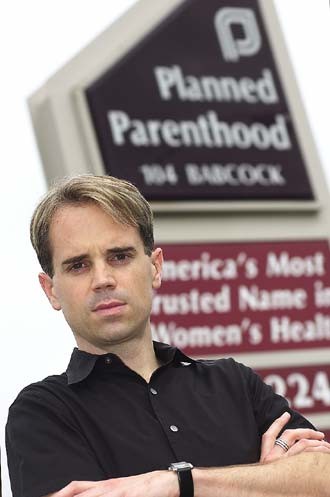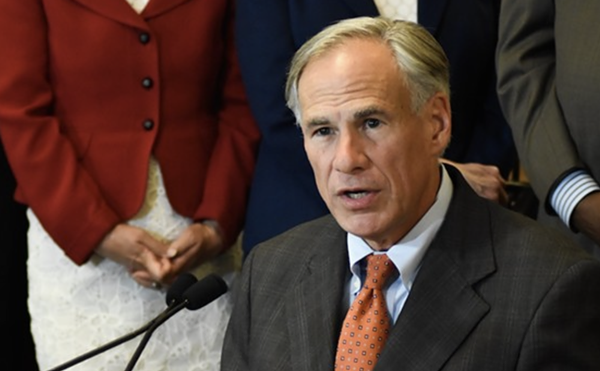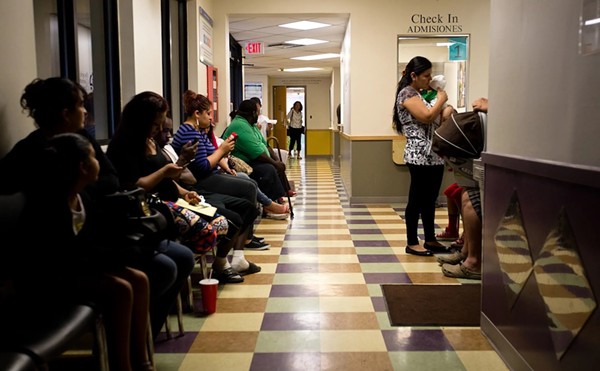| Jeffrey Hons, President and CEO of Planned Parenthood of San Antonio and South Central Texas, stands outside the main office in San Antonio. Photo by Mark Greenberg |
The courtroom is silent, save for a few whispers. Wrappers crinkle. Pages turn. Zippers open - but the pens in the room lie still. The count is seven to two: seven attorneys working for the government, versus two representing Planned Parenthood. The date is July 25. At exactly 5 p.m., a temporary restraining order will expire, and Planned Parenthood will be faced with the unthinkable: the choice between signing a waiver agreeing to stop providing abortion care and counseling, or losing $13 million dollars in federal funding. All rise, and US District Court Judge Sam Sparks begins the preliminary injunction in the case Planned Parenthood v. Eduardo Sanchez. In a flat tone, Sparks greets the full spectator benches: "Welcome to Federal Court."
The crowd has assembled today to hear PP's challenge to the legality of Rider 8, an appropriations amendment that would slash PP's budget by nearly 40 percent. Underneath the formal, lacquered words of the injunction, the subtext is clear. This is the latest battle in the war against the right to an abortion, and even the judge knows it. As he later comments to defense counsel, "We all know what Rider 8 was, and what it intended. Now we are seeing if they can get away with it."
Unable to declare abortion illegal, right-to-life legislators have set their sights on making it impossible, attacking women's rights from the peripheries of the issue. Right-to-lifers in the 78th session placed a series of stumbling blocks in the paths of women who seek to terminate their pregnancies, and the providers of abortion care have been systematically marginalized and de-funded. But the most egregious insult in the siege has been the Trojan Horse approach: echoing W.'s policy of naming policies for the exact opposite of their true function, and using the language of rights and choice to erode both. Writes Jeffrey Hons, CEO & President of Planned Parenthood San Antonio and South Central Texas: "There are times to play nice and try to get along. And then there are times to make a stand and fight back."
INSIDE THE TRIANGLE
It has been 30 years since Roe v. Wade, and the right to an abortion seems a given - for adult women with access to private health care. "Abortion rights in America," Hons explains, "are unassailable within these certain parameters: adult women, with their own money, in the first trimester." But outside of that constitutionally protected bubble, a constant barrage of anti-choice legislation has chipped away the rights of the women on the margins of society: pregnant teens, women considering later-term abortions, and poor women dependent on the state for their health care. The result has been a precipitous decline in availability of services for the women who need it the most. "They have been very successful in taking statistically tiny numbers, and turning them into huge social issues," says Hons. Current Texas law requires abortion providers to notify a parent 48 hours in advance of an abortion, unless a judge grants her permission himself through a judicial bypass. Parental consent proposals are bandied about regularity: Out of the 1,238 abortions PP performed last year, only an estimated 20 were to girls without their parents.
At the federal level, the Senate and the House have recently targeted late-term abortion - a procedure rarely performed, and then only when carrying the pregnancy to term would kill the mother. In 2000, the Supreme Court ruled that the ban on "partial-birth" abortions was unconstitutional: both because it did not provide medical exemptions, and because the language of law would have essentially outlawed second trimester abortions. And yet in 2003, a Partial Birth Abortion ban sits waiting for a signature on the President's desk, having passed the Senate in March, and the House in June.
The glibly named Prenatal Protection Act (SB319) was passed by the Texas Legislature this past session. Ostensibly a bill to punish perpetrators of violence against pregnant women, the bill begins with defining life at fertilization, and ends short of imposing any additional penalties on those who beat, rob, murder, or rape pregnant women. As of September 1, zygotes will be granted personhood in the state of Texas.
In a state with the highest number of uninsured citizens in the nation, where abstinence-only sex education is federally mandated via funding restrictions, and the teen birth, pregnancy, and STD rates are among the highest in the U.S., `see the Current, Feb 13-19`, the need for government-assisted family planning programs could not be greater. But it is here that the most virulent attacks against the right to choose have been directed: slashing social services to the bone with Rider 8. In San Antonio, there are six Planned Parenthoods: three that receive federal monies (the Las Palmas, Southeast, and Lupe clinics), and one that performs abortions. Of the patients who receive subsidized health care from Planned Parenthood, 95 percent make less than $21,240 a year. That's for a family of three.
Rider 8 would take away Title X and Title XX funding from these three Planned Parenthoods and the women they serve - not because the money was being improperly used to fund abortions - but because the state claims it doesn't have the resources to adequately monitor the use of the money. A quick flip through the history book indicates otherwise. Using federal money (Medicaid) to fund abortion has been illegal since the 1976 Hyde Amendment. In 1989, Webster v. Reproductive Health Services allowed the state to deny money to organizations that merely counseled abortions; it also restricted abortions to privately funded facilities, and prohibited public employees from performing the procedure. A 1991 Supreme Court ruling required clinics to financially and physically separate Title X funded services from the privately funded abortion clinics, and a 1995 Texas law specifically prohibits public money from paying for abortions. In other words, by the time that Planned Parenthood started offering abortion services in 1997, the purported goal of Rider 8 - preventing public money from subsidizing abortion - had long been accomplished. As Hons puts it: "There is no taxpayer money paying for abortions, so why are we arguing this?"
To settle the issue, Planned Parenthood Director of Government Affairs Jennifer Bilbrey tried to propose a provision to the Rider that would allow for the auditing of Planned Parenthood, but the committee politely denied her request: "Unfortunately, the conference committee was not interested in that kind of language."
ACCESS DENIED
While the right to an abortion grows shakier, and the likelihood of being able to afford it erodes, Texas legislators have added yet another hurdle: The Woman's Right to Know Act (HB 15), which requires a 24-hour waiting period, after receiving state-mandated information, for adult women who elect to terminate their pregnancies. Although seemingly neutral, the waiting period negatively impacts poor, rural women, who must travel to one of the 15 out of 254 counties in Texas that provide abortions. "This is a mean-spirited attempt to force her to spend another 65 bucks at La Quinta or something, and that's just crap," fumes Hons. "She doesn't have that kind of money." Furthermore, he adds, "It's a moral insult to the intellect and adultness of women to say that, "Oh, little girl, did you think about this? I know how women are, changing their minds ..."
Despite efforts of pro-choice lobbyists, survivors of rape and incest will also have to wait out the 24-hour period. As the Houston Chronicle reports, Senator Gonzalo Barrientos, (D-Austin), who authored the rape exemption, posed the following question to the floor: "Who am I or who are you or who is the Texas government" to tell a woman who's survived rape or incest what do with the resulting pregnacy? Senator Robert Deuell, (R-Greenville), replied that many women in similar shoes "kept the child and counted that child as a blessing."
That long, 24-hour wait is further compounded by the reading materials that the state, beginning September 1, will provide free of charge. HB15 mandates the inclusion of color photos of aborted fetuses along with the traditional, and very comprehensive, information that Planned Parenthood provides their patients. (For comparision's sake, imagine being forced to view images of a transurethral resection of the prostate gland prior to your operation.) Also included in the reading package are allegations of the possible link between breast cancer and abortions: a charge that the National Institute of Health, the American Cancer Society, the American Medical Association, and six other major medical organizations emphatically deny. How can the state government force women to read frightening material that the nation's top doctors all agree is bullshit? "As long as there is a doctor (Senator Deuell), on the floor of the Senate to say this kind of stuff," Bilbrey posits, "What else is any member going to say? How do they have the credibility?"
SPARKS IN THE COURT
"Rider 8 doesn't give them any way out," Judge Sparks told the defense counsel for Texas Department of Health Commissioner Eduardo Sanchez. Rider 8 would prohibit Planned Parenthood from providing abortions, or affliating or contracting with anyone who does. The language is quite clear, and although the state argued that Planned Parenthood could simply create a subaffliate, Sparks didn't seem to appreciate the legal merits of the argument: "Like movies, Bambi and Bambi2?" Planned Parenthood is filing suit under the merits that Rider 8 violates the Federal Supremacy clause by attaching state requirements to federal monies, and that denying distribution of that money due to exercising, or associating with a constitutional protected right such as abortion violates the 14th amendment. But whether Planned Parenthood is authorized to bring such a suit remains to be seen. The plaintiff's attorney couldn't produce case law, frustrating Sparks: "Everytime I look at these causes of action, its like looking at smoke." The state, on the other hand, claims no punitive intentions in cutting off Planned Parenthood funding, stating that they are just taking a "proactive" approach to enforcing federal regulations. Planned Parenthood doesn't have a constitutional right to family planning services, the state maintains, and if there is such a right, it would belong to a woman - not Planned Parenthood. At the time the Current went to press, the ruling on the preliminary injunction had not yet been handed down.
With the reproductive futures of thousands of Texan women cast upon the gambling table, Planned Parenthood remains calm and collected: "Under no scenario will we close our doors," maintains Bilbrey. Each side remains confident, but by no means is the outcome clear. As the Honorable Sam Sparks said as he chided defense counsel, "Be careful when you say you agree with me, because I don't think anyone in this court knows what I'm thinking." •
Next week: The future of abortion rights in San Antonio.


















